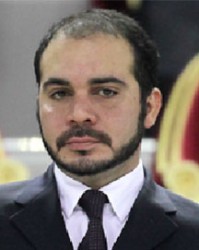LONDON, (Reuters) – For the first time since 1998 when he beat Sweden’s Lennart Johansson in a bitterly fought campaign, Sepp Blatter is facing a real challenge for the FIFA presidency this year.
Prince Ali Bin Al Hussein of Jordan, who was not even born when Blatter first joined FIFA as its technical director in 1975, declared his candidacy on Tuesday, promising to make the organisation more transparent.
The 39-year-old royal faces a tough battle to beat the 78-year-old Swiss who is expected to formally declare his intention to stand for a fifth term before the Jan. 29 nomination deadline even though FIFA, and Blatter, have been engulfed in one scandal after another for years.
Until Prince Ali, who has some powerful backers including UEFA president Michel Platini, announced his intentions the only other runner was FIFA’s former deputy secretary-general Jerome Champagne.
The 56-year-old former French diplomat declared his candidature a year ago and like Ali, is committed to bringing much-needed change to world soccer’s governing body which is generally perceived as a corrupt, secretive organisation.
But however well-intentioned Champagne is and despite a series of absorbingly well-argued documents outlining a brighter footballing future if he became FIFA president, it is difficult to see where his votes will come from — especially as Prince Ali has now thrown his hat in the ring.
REAL ALTERNATIVE

Because, to all intents and purposes, Prince Ali, FIFA’s Asia vice-president perceived as the leading reformist member of the FIFA executive committee, will be regarded as the only credible alternative to the old guard.
The election will take place at the FIFA Congress in Zurich on May 29 and is a one-member one-vote process with an outright winner needing two-thirds of the 209 votes cast.
If the vote was held today, Blatter would probably hold an advantage of around 120-90 and the ageing tyro is probably secure enough to withstand Ali’s attack because, as ever, he is the man holding all the aces.
And it almost seems impossible to imagine that the Swiss will not be milking the applause after a fifth election victory following his earlier successes in 1998, 2002, 2007 and 2011.
In those 17 years, he has only faced two challenges — first when he beat UEFA’s Swedish president Johansson for the seat left vacant following the retirement of 82-year-old Joao Havelange 111-80, and again in 2002 when he saw off a half-hearted campaign headed by Cameroonian Issa Hayatou, the president of the African confederation by 139 votes to 56.





